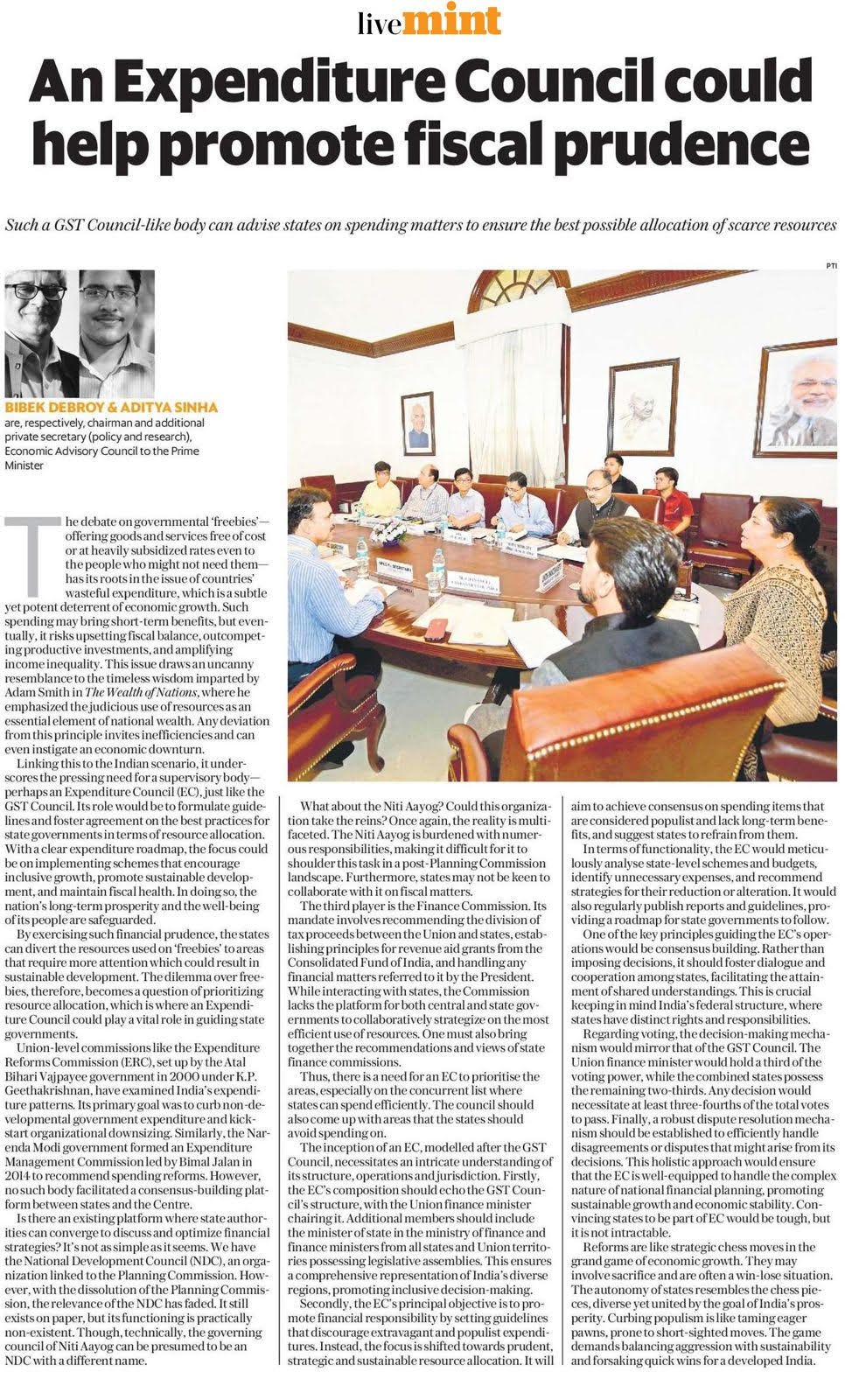An Expenditure Council for States: A Contrasting Perspective
Striking a Delicate Balance: Navigating the Complex Interplay of Legislative Sanction, Constitutional Provisions, and Fiscal Prudence in the Proposal for an Expenditure Council for the States.
Introduction: In a recent article (Live Mint dated 7th June, 2023), two eminent scholars, Mr. Bibek Debroy, Chairman of the Economic Advisory Council to the Prime Minister and Mr. Aditya Sinha put forth the idea of establishing an Expenditure Council for the States on the pattern of the Goods and Services Tax (GST) panel. While their proposal offers fresh insights, it is important to critically examine the feasibility and implications of such a Council. In this article, we present counterpoints that shed light on the challenges and potential room for improvement associated with this suggestion.
Legislative Sanction: One fundamental principle of governance, as enshrined in the Constitution of India, is that no expenditure can be incurred without legislative approval from the Lok Sabha or the Vidhan Sabha, in case of the states. This democratic process ensures accountability and transparency in financial decisions. Therefore, it is crucial to respect and uphold this legislative sanction, which serves as a check on imprudent spending.
Constitutional Provisions: The Central Finance Commission and State Finance Commissions play a significant role in determining the constitutional obligations related to financial matters, relating to the devolution to the States as well as the PRIs and ULBs. These constitutional entities consider various factors such as population, fiscal capacity, and infrastructure requirements when recommending resource allocations to the States as well to the Panchayati Raj Institutions (PRIs) and Urban Local Bodies (ULBs). It is essential to respect and adhere to these provisions, which ensure a fair and equitable distribution of resources.
Fiscal Responsibility Acts: Both the Central Government and State Governments have enacted their respective Fiscal Responsibility Acts to ensure prudent fiscal management. These acts aim to maintain fiscal discipline, control deficits, and promote responsible spending. Adhering to these legislative measures is crucial in fostering fiscal stability and preventing unwarranted expenditures.
Borrowing Limits: Under constitutional provisions (Article 293(3)), the Central Government sets annual borrowing limits for State Governments. This mechanism helps regulate debt levels and prevents excessive borrowing, ensuring long-term financial sustainability. By adhering to these borrowing limits, States can mitigate the risk of overburdening themselves with debt.
Constitutional Amendment and Federal Principles: Implementing the proposed Expenditure Council would require a constitutional amendment, which might not be politically feasible in the current context. Additionally, this suggestion raises concerns about encroaching upon the federal principles enshrined in our Constitution. Striking the right balance between central oversight and state autonomy is crucial for a harmonious fiscal framework.
The other relevant issues that need to be tackled from an expenditure perspective are now discussed below:
Addressing Overstaffing and Overpayment: Many States struggle with an excess of staff, often accompanied by higher-than-the-market salaries. However, the issue of overstaffing and overpayment requires careful consideration and a politically viable solution. Tackling these challenges demands a multi-faceted approach that involves structural reforms, skill-building initiatives, and incentivizing efficiency within the bureaucratic framework.
Pension and Pensionary Benefits: The issue of pension and pensionary benefits is a significant concern, whether under the old pension scheme or the National Pension System (NPS). Addressing the financial burden associated with these obligations necessitates a comprehensive evaluation of the pension structure, including potential reforms that strike a balance between ensuring retirees' welfare and managing fiscal constraints.
Debt-Servicing: Accumulated debt and its associated servicing costs pose significant challenges for state governments. While it may be difficult to save directly on debt-servicing, prudent financial management, including debt restructuring and refinancing strategies, can help alleviate the burden and create fiscal space for developmental initiatives.
Tackling Subsidies: Certain subsidies, such as power subsidies in Punjab, often become "holy cow" items that are politically sensitive. Addressing these subsidies requires a delicate balance between ensuring social welfare and promoting fiscal sustainability. A comprehensive review of subsidy programs, accompanied by targeted reforms, can help strike this balance effectively.
The Need for Structural Reforms: Many States are facing severe financial challenges that cannot be addressed through minor adjustments alone. Undertaking substantial structural reforms is necessary to rectify the underlying issues and establish a sustainable fiscal foundation. While it may involve short-term pain, a comprehensive and well-executed reform agenda is essential for long-term financial stability.
Conclusion: While Mr. Bibek Debroy and Mr. Aditya Sinha present interesting insights with their proposal for an Expenditure Council for the States, it is crucial to examine the feasibility and potential drawbacks associated with such a Council. Upholding legislative sanction, respecting constitutional provisions, adhering to fiscal responsibility acts, and finding a delicate balance between federal principles and central oversight are key considerations. Addressing overstaffing, managing pensionary obligations, tackling debt burdens, and rationalizing subsidies require comprehensive and politically viable solutions. Ultimately, a combination of prudent financial management and well-designed structural reforms is necessary to achieve the financial health and stability that our States require.
What is required at this stage is not a sweet medicine but comprehensive surgery.
____________________________________________________________________________
KBS Sidhu. The Author is an IAS officer of 1984 Batch of Punjab cadre, and retired from service in July 2021, as Special Chief Secretary, Punjab, after 37 years of service.
He can be reached on kbs.sidhu@gmail.com or @kbssidhu1961 or https://www.facebook.com/kbs.sidhu






